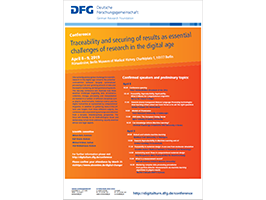The Digital Turn in the Sciences and Humanities
One currently pivotal global challenge for scientific research in the digital age concerns the potential contradiction between (largely) automatized processing of an ever-growing amount of data and the need for validating, verifying and securing results. This two-day conference will illustrate how these essential challenges regarding data provenance, collection, storage, processing and interpretation are tackled in a number of different disciplines such as physics, bioinformatics, materials science and the digital humanities as represented by computational linguistics. In addition to gathering state-of-the-art facts and insights from these different subjects, the conference aims at promoting exchange and reflection from a broader, interdisciplinary perspective. The focus will thereby lie on methodological issues and deliberately refrain from addressing -equally essential- ethical and legal aspects.
The conference is part of the Digital Turn in the Sciences and Humanities project launched by the Head Office of the German Research Foundation with the aim to assess and respond to key developments in the sciences and humanities in the digital age. For further information please visit
Confirmed speakers and preliminary topics (in alphabetical order)
| Speaker | Topic |
|---|---|
| Christian Bauckhag (Fraunhofer IAIS/ University of Bonn) | Can knowledge inform Machine Learning? |
| Chandler Becke (National Institute of Standards and Technology) | Traceability in materials design: A use case from molecular simulation |
| Peter Bunema (University of Edinburgh) | Data Provenance |
| Martin Erdman (RWTH Aachen) | Mastering complex data processing procedures: from particle detector measurements via machine learning algorithms to physics results |
| Michaël-Andreas Esfel (Lausanne University) | What is a measurement record? |
| Antske Fokken (VU Amsterdam) | Towards (more) transparent Natural Language Processing technologies: How teaching others about our tools forces us to ask the right questions |
| Björn Grünin (Freiburg University) | FAIR data: The European Galaxy Server |
| Matthias Hei (University of Tübingen) | Robust and reliable machine learning |
| Nancy Id (Vassar College) | Traceability, Reproducibility, Replicability...What It Means for Computational Linguistics |
| Kristian Kerstin (TU Darmstadt) | Towards Reproducibility in Machine Learning and AI |
| Jörg Neugebaue (Max-Planck-Institut für Eisenforschung) | Automizing work flows in computational materials design |
Scientific committee
- Miriam Butt, Konstanz (general and computational linguistics)
- Ralf Drautz, Bochum (material science, material simulation)
- Michael Krämer, Aachen (theoretical elementary particle physics)
- Olaf Wolkenhauer, Rostock (systems biology and bioinformatics)
Contact
| E-mail: | eva.trendel@dfg.de |
| Telephone: | +49 (228) 885-2617 |
